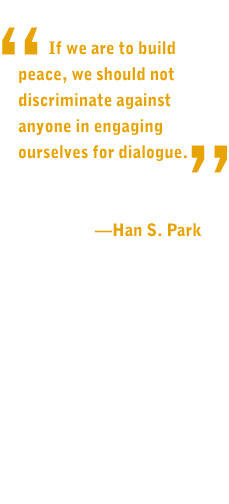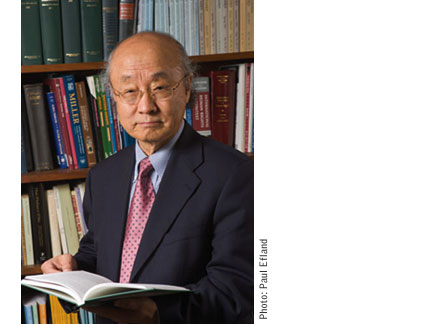


Peace, Not Security
by Han S. Park


For 2000 years, mankind has sought an orderly world through security regimes. A security regime is an international system of relationships in which a hierarchical order is maintained. Such a regime is created as a result of military conflicts whereby winners and losers are assigned their proper positions in a world order. The winner has dominated the loser, and the latter assumes a submissive position to the former. A world system predicated upon a security paradigm provides a sense of predictability, accountability, and regulated patterns of relationships.
But with the end of the Cold War world order, history has shown the diminishing prevalence of the security paradigm, in which military might alone can no longer guarantee security. Two grand historical forces have made this fundamental transformation possible. First, witnessing the destructive power of the atomic bomb that ended the WW II, governments and non-government entities with the ambition of either becoming a dominant power or avoiding a surrogate position have competed to develop weapons of mass destruction (WMD), including the nuclear bomb itself. Many have succeeded, and many more are on the move. Yet, the inherently secretive nature of these weapons makes it impossible for us to manage or curtail their explosive proliferations.
Small “rogue” states and terrorist groups are often empowered by the acquisition of WMD, and we seem to have no viable means of stopping them. Secondly, the massive force of globalization, which is often seen as a spillover of American and Western capitalist economies, creates a homogeneous culture whereby local and indigenous cultural attributes are threatened. Many outside the Judeo-Christian civilization view globalization as a grand imperialist strategy by the dominant post-industrial forces. This provides them with the incentive to mobilize their forces against the forces of globalization. The resurgence of ethnic and religious groups around the world can be seen as the expression of their desperate desire to restore and maintain their identities. To many of these people, values and cultural identities are more important than material and bodily assets.

Viewing the current “war on terrorism” sparked by 9/11 in this context, then, we must not rely on military means to restore our security. The sooner we realize the mythical nature of the security regime, the better! We have no choice, nor do we have time to waste as more soldiers and civilians are killed and wounded each passing day. We the intellectuals who see history in a grand stride must offer an alternative paradigm for a world order in this our time and beyond.
The paradigm that is called for is one in which diverse nations and interests become mutually beneficial, thus creating a system of win-win relationships. Such as system reflects a legitimate peace regime under which peace, and not security, becomes the overarching objective. Indeed, peace and security are two distinct concepts. Peace is not a state devoid of conflict. Rather, it is harmony, and harmony is the creation of oneness out of diversity. The harmonious relationship is not vertical, but horizontal.
In a peace regime, differences are accepted and respected, domination is replaced by coordination, accommodation is favored over assimilation, and ultimately, dialogue is used as the only instrument for its creation. A peace regime requires a culture of diversity and relativism. We must have faith in dialogue and compromise. These norms are essential elements of democracy. One might ask: Can we and should we accommodate terrorist behavior in the name of harmony and accommodation? Certainly not! Terrorism should be allowed no room in a civilized world. However, our efforts to eliminate terrorism should never resort to the instrument of a security regime, i.e., physical coercion through military or economic sanction. In the post-Cold War era, neither has worked.
Treating those with different orientations that may contradict or be incompatible with our own as being sub-human, controllable by military threat or economic punishment, is a fruitless endeavor. Those people defiant of our coercive attempts at reform are precisely those that turn to unconventional means of expressing their will through terrorist acts, and they can be a formidable force to be dealt with. We are losing the war against terrorism not because of our inability to “punish” the so-called insurgents militarily or economically, but because we are using the outmoded, counterproductive strategy borrowed from the security paradigm.
If we are to build peace, we should not discriminate against anyone in engaging ourselves for dialogue. As the most powerful state in the world, we should not “outsource” our diplomacy to other countries. It is short sighted to avoid direct talks with North Korea by commissioning China and others to deal with our own diplomatic issues. It is ill-advised to expect the European Union to handle the nuclear issue of Iran for us.
The tragic legacy of the security paradigm is that dominant powers must continuously have an enemy to fuel military expansion. With the Soviets gone, we were left with no one to challenge our superpower status, and then 9/11 criminals disturbed our pride and self-esteem. Sadly, the Bush Administration used the events of 9/11 as a push towards full-scale war, thus, through no small measure of irony, providing the terrorists the “legitimacy” they so crave. Provoking a sense of security threat and engaging oneself with external conflicts can, as history testifies, justify dictatorships and undermine democratic norms and processes. With the “war against terrorism,” we may indeed be witnessing this inevitable consequence, embodied in our acceptance of the Patriot Act and the recent compromises to our right to privacy through spurious wiretapping. We cannot win this war, and the grim prospect is that it will linger on into the uncharted future, imposing on our young people ultimate sacrifices, draining our resources, and alienating ourselves in world’s public opinion.
I am reminded by the chilling words of Osama Bin Laden, “we cannot destroy America but we will make it bleed to death.” Defeating him and other terrorists means engineering a campaign for peace building to create a civilized world in which the outlaws will find no comfort; otherwise, we play into their hands by waging the unwinnable war. We are at a crossroads in history that challenges us to deliver a new world order to future generations. Meeting this challenge begins with realizing and accepting the shortcomings of a security regime, and valuing the wisdom of the peace paradigm.
Han Park, director of the Center for the Study of Global Issues (GLOBIS) and University Professor of Public and International Affairs at the University of Georgia, is a widely published scholar of globalization and development. As a leading expert on the current and historic political situation between North and South Korea, as well as an unofficial diplomatic go-between for the Korean Peninsula and the United States, Park has played and continues to play a pivotal diplomatic role in ameliorating relations between the two Koreas and the U.S. relationship with North Korea. He has organized a series of Tract-II diplomacy conferences at the UGA by inviting policy makers and experts from mutually adversarial governments including North Korea and the United States.
Born in China into a Korean refugee family, Park studied in China, Korea and the United States and joined the UGA faculty in 1970. As the director of GLOBIS, he has made many contributions to global education and scholarship through creating study abroad programs and leading collaborative research initiatives. Park also has been very involved in humanitarian efforts in East Asia, in particular with his foundation, Uniting Families, Inc., which has reunited many families straddling the China-Korea border. He frequently serves as an expert consultant for various media outlets, including ABC, BBC, NPR, CNN International, The New York Times and numerous other sources in the United States, Europe, Japan and Korea.
For comments or for information please e-mail: rcomm@uga.edu
To contact the webmaster please email: ovprweb@uga.edu
![]()